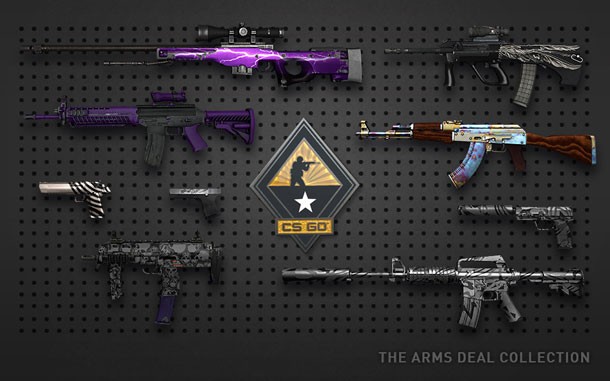Please support Game Informer. Print magazine subscriptions are less than $2 per issue
Popular YouTubers Embroiled In CS:GO Gambling Site Scandal

As media evolves, it goes through growing pains. None has been more evident than the struggle of YouTube and Twitch personalities that straddle the line between critic and entertainer.
With millions of followers watching these "influencers" play games, promote products, and blatantly tout big sponsorships (an ethical no-fly zone for traditional media), the need for clear and prominent disclosure is crucial. That community has been slowly coming to grips with those needs, with scandals dotting the brief history of the format.
In early 2014, Machinima was discovered to have expressly prohibited network members from disclosing a Microsoft sponsorship agreement. The matter left Machinima 20 years of oversight by the Federal Trade Commission.
One of the YouTubers who failed to disclose during the Machinima event and again in another instance in 2015, was Tom Cassell, who goes by the name Syndicate. He is now involved in another disclosure scandal that involves far more than the $30,000 he made from positively showcasing Xbox One without informing viewers of the financial relationship.
Cassell and YouTuber Trevor Martin (TmarTn) have been discovered to own CS:GO Lotto. The site takes advantage of online gambling loopholes and allows minors to participate.
Counter-Strike: Global Offensive (CS:GO) features an in-game monetization mechanism that uses a slot-machine style randomization method. Players collect crates while playing and pay $2.50 for keys to unlock them. These include gun and knife skins.
CS:GO is one reason Valve has a problem with account hijacking. Skins can sell on the Steam community marketplace for thousands of dollars. Because Valve isn't setting the value of these skins itself, it skirts gambling legislation.
Players are spending $2.50 for a skin that has no assigned monetary value. The community-set pricing is separate, and therefore slides through a loophole.
We reached out to Valve for comment, but none was provided by publication. We can reflect on the company's recent statements about its interest in preserving the economy, though.
Valve instituted two-factor authentication for item trades this year. It used to duplicate items stolen from hacked accounts, but ceased the practice because of how it can damage marketplace pricing (of which it takes a cut of every sale).
"Once an account was compromised, the items would be quickly cleaned out," Valve explained. "They'd then be traded again and again, eventually being sold to an innocent user. Looking at their account activity, it wasn't too hard to figure out what happened, but undoing it was harder because we don't want to take things away from innocent users. We decided to err on the side of protecting them: we left the stolen goods, and we created duplicates on the original compromised account to replace them. We were fully aware of the tradeoff here. Duplicating the stolen items devalues all the other equivalent items in the economy. This might be fairly minor for common items, but for rare items this had the potential to significantly increase the number in existence."
In 2014, Valve's Kyle Davis touted the importance to the company of giving players financial motivation. “This is not an accident. This is by design,” he said. "We see more blogs popping up and more and more e-mails from our players saying, ‘I’m not really sure what happened but I’ve been playing DotA for the last week or two, and I made $100 selling these items that I got.’ This is hugely successful for us.” You can watch the entire talk below.
Sites like CS:GO Lotto, which are reportedly responsible for billions of revenue each year, take the gambling a step further. Players wager their skins, the wheel spins, and one lucky player takes the entire pot. Those items are then transferred to the winner's Steam account. The process is detailed on CS:GO Lotto here.
Cassell and Martin promoted the site in videos with incomplete disclosure. We can see that Cassell's videos currently display a single-sentence sponsorship notification further down in the video description. You can only see it if you click to see the entire lengthy note, where it appears under a long list of self-promotion. It's unclear whether those disclosures have been present the entire time.

Martin has made his CS:GO Lotto videos private. We cannot verify the level of disclosure on his videos.
However, in the video produced by H3H3 surfacing this conflict, Martin suggests he stumbled upon the site because of a friend. Clearly that is inaccurate given his title as president of the company. Further, H3H3 identifies that disclosures were added recently and not at the time the videos were published.
There is also footage of Martin denying he was involved in the company when he claims to have just found the site and was hoping for sponsorship. Corporate filings, which he submitted to the state of Florida, clearly dispute his version of the timeline.
The issue, as surfaced by H3H3, is that the videos show both of these individuals winning huge sums of money. As co-owners, these might not be live gambling events displayed and instead could be mock-ups for promotional purpose. If the actual events were captured live, both could have manipulated the results as owners of the site.
At this point, Martin and Cassell have not responded to request for comment. Valve is now warning users the site may be unsafe when attempting to login via CS:GO Lotto, though that can be bypassed.
Cassell shared the following via Twitter, suggesting he took legal advice from YouTube about FTC disclosure rather than consulting an attorney.

We'll continue to update as more information becomes available. For more, check out H3H3's video (above).
Note: Additional details from H3H3 that dispute claims by Martin and Cassell have been added.
Update: Valve has removed the warning message that appeared for a short time today when users attempted to log into CS:GO Lotto with their Steam accounts. Valve, Martin, and Cassell have yet to respond to our requests for comment.
[Source: Corporate filing, class action suit, H3H3, HonorTheCall]
Our Take
Whether Cassell and Martin did manipulate results is certainly an important point, but not the only one. The fact they could have means failure to disclose the extent of the relationship is extremely problematic, especially as they were coy when presenting it to their subscribers. Perception matters, which is why all the FanDuel ads we were plagued with during football season last year carry disclosures, disclaimers, and warnings about displayed results not being a guarantee.
Valve has a hand in this. Perhaps they are clear from a legal standpoint, but this is how new legislation is born. Expect to hear more on this in the coming days.










